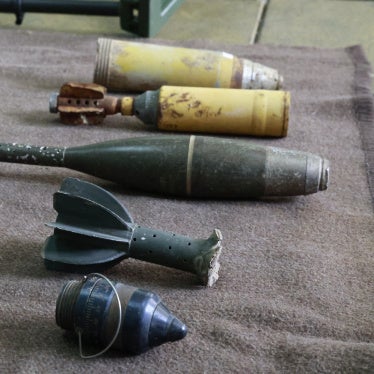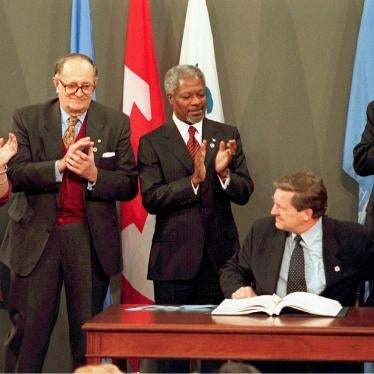Thank you Mr. President.
Over the course of the past two weeks, we have listened carefully to the litany of purported benefits of a new CCW protocol on cluster munitions. Some states seem flabbergasted that so many governments, as well as the Cluster Munition Coalition and the ICRC, could remain strongly opposed to the draft protocol.
There is a simple answer: we are convinced the protocol will do more humanitarian harm than good. The draft protocol has become worse, not better, during these two weeks of negotiations. This protocol is likely to lead to an increase in the use of cluster munitions known to cause unacceptable harm to civilians. It is likely to lead to increased civilian casualties, and increased socio-economic devastation.
The partial prohibitions and restrictions in the draft protocol will not make a significant difference from a humanitarian perspective. The draft protocol allows for use of the vast majority of cluster munitions in the stockpiles of States Parties—many millions of cluster munitions containing hundreds of millions, perhaps billions, of submunitions. It will promote increased use by providing both legal and political cover for those who insist on deploying weapons that have already caused so much civilian suffering.
In addition to the direct human costs, countries should not underestimate the threat that the protocol poses to international humanitarian law. Never before have states adopted a lower humanitarian standard in an international instrument after a higher standard has already been enacted. This regression in international humanitarian law is a terrible precedent to set.
Nevertheless, some seem perplexed that we would object to new binding rules for the major users, producers, and stockpilers of cluster munitions. But, the binding rules contained in the draft protocol are so weak and riddled with exceptions, exemptions, and loopholes, that they will not, on balance, have a positive humanitarian impact. The protocol may not require states to do anything that they are not already planning to do.
In that vein, let’s look more closely at the prohibition on use of cluster munitions produced before 1980, the provision that is being cited as the one that will have the most extensive and immediate humanitarian impact. We have also heard a number of countries lament how costly and burdensome this provision will be for them. But most of these 30-plus-year-old munitions have reached or are about to reach the end of their shelf-life and will have to be withdrawn from service, with or without a protocol. States will have to destroy these cluster munitions anyway when they become obsolete. The draft protocol does not establish a timetable for destruction. We can be confident that the major users and producers are not going to be accelerating their destruction plans as a result of the protocol. The weapons will be destroyed at the same rate and at the same cost with or without the protocol.
More important, states will still have the bulk of their stocks (those produced after 1980) available for use, and those are the cluster munitions that the militaries are more likely to use, with or without a protocol. The draft protocol would allow ongoing use of an estimated two-thirds of the current stocks held by states that have not yet joined the ban convention.
And most important, the post-1980 cluster munitions are not “life-saving” or “safe” cluster munitions. It is well-documented that those cluster munitions—with or without a safeguard mechanism—cause unacceptable harm to civilians.
Even after three revised versions of the draft protocol, the fundamental flaws still exist. States would be able to use forever and without limitation cluster munitions with a failure rate of less than 1%, and cluster munitions with one safeguard. States would be able to use for a lengthy period cluster munitions with no safeguards—cluster munitions that all CCW states have agreed need to be banned due to the dangers they pose to civilians.
This protocol does not represent an urgent, humanitarian response. To reply to the question asked repeatedly by the US delegation: it is easy for us to imagine a world without Protocol VI, because it will be a safer world.
In conclusion, Mr. President, we want to stress that the CCW’s credibility and reputation will be damaged, not strengthened, by a weak, regressive protocol that will be widely viewed as serving the interests of a few big states, as backtracking on the comprehensive ban and the norm it is establishing, and as setting a dangerous precedent in international humanitarian law.
Thank you.








